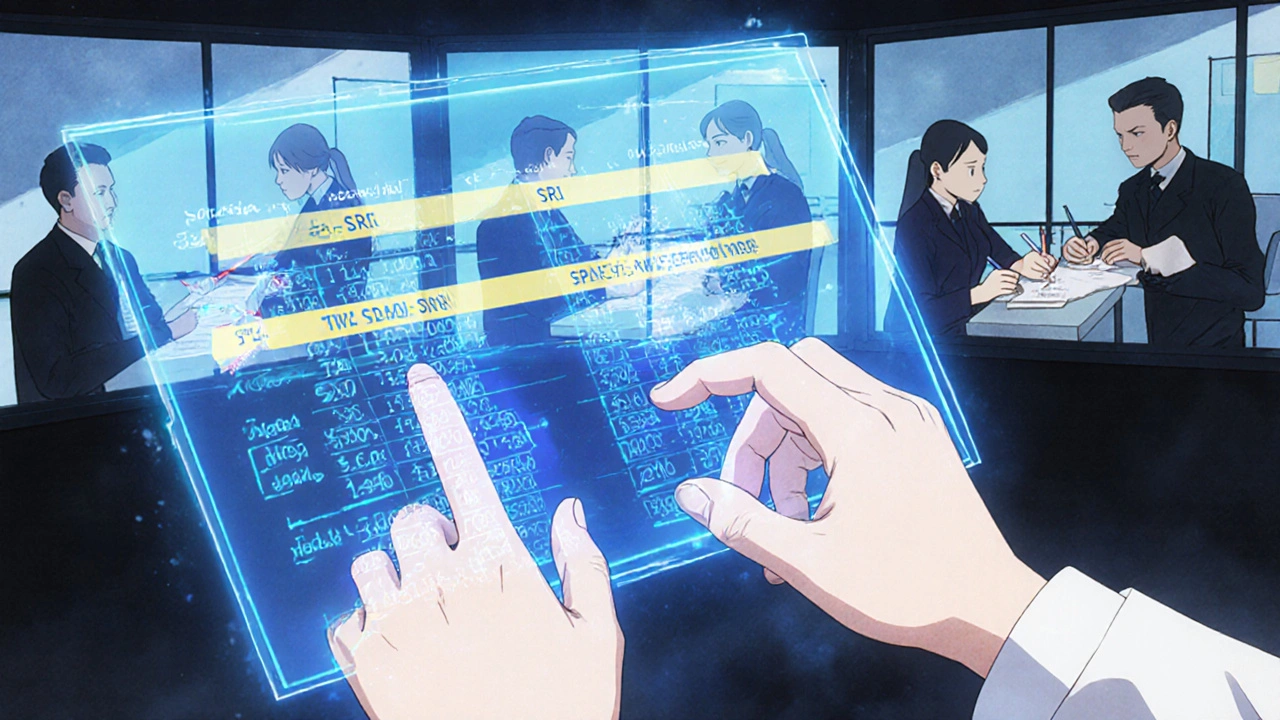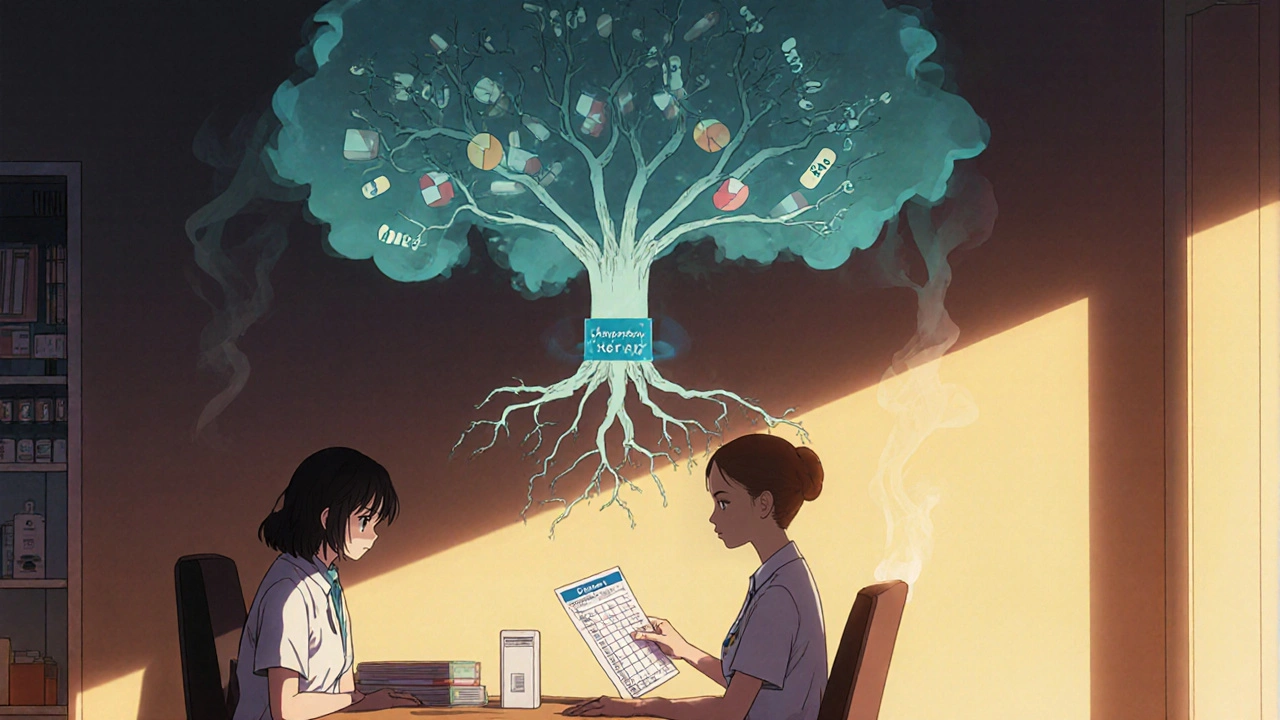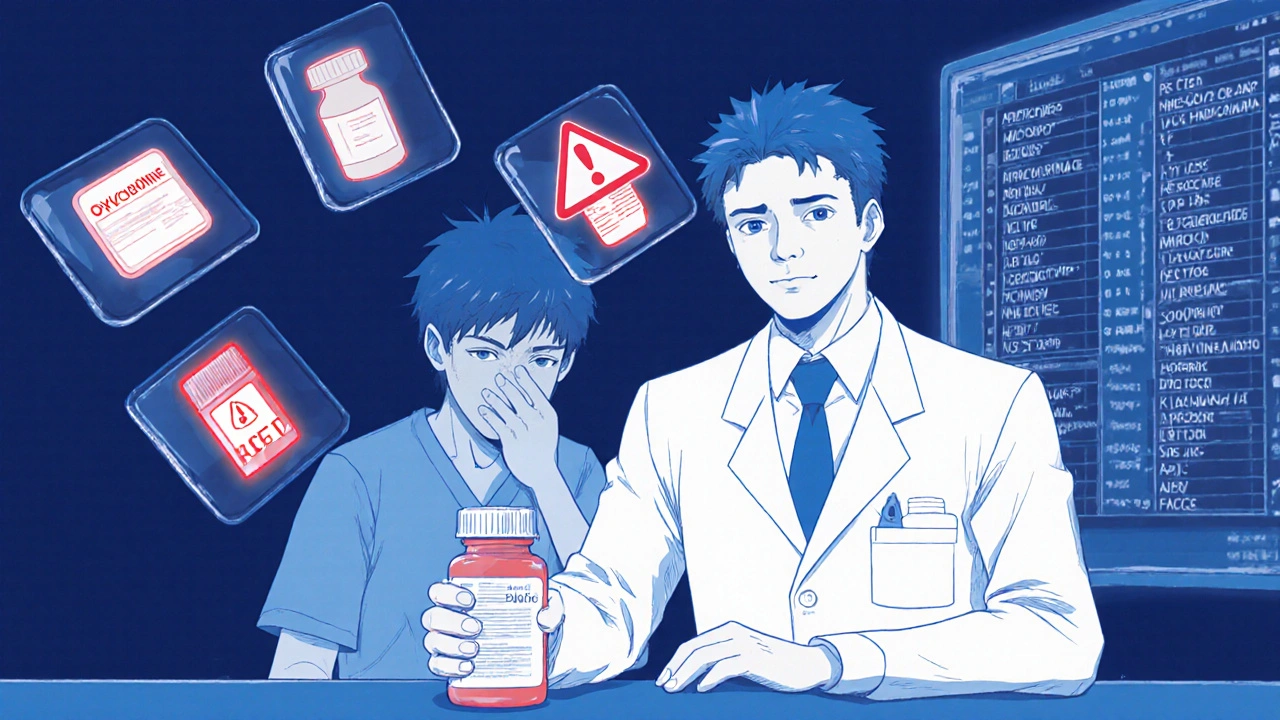Every month, pharmacists face the same problem: patients showing up days before their prescription should be due, asking for a refill. Some say their pills ran out. Others claim their insurance lets them get it early. A few even offer to pay cash. But behind these requests, there’s often something more dangerous - early refills and duplicate therapy mistakes that can lead to overdose, addiction, or harmful drug interactions.
These aren’t just administrative headaches. They’re patient safety risks. The CDC reports that medication non-adherence contributes to 125,000 deaths each year in the U.S. alone. Meanwhile, early refills for controlled substances like oxycodone or alprazolam are a red flag for potential misuse. And when patients visit multiple pharmacies or prescribers, duplicate prescriptions - say, two different doctors prescribing the same opioid or two benzodiazepines - can stack up unnoticed until it’s too late.
Why Early Refills Are a Red Flag
Getting a 30-day prescription filled 10 days early might seem harmless. But if it happens month after month, it’s not a mistake - it’s a pattern. The DEA strictly prohibits refills for Schedule II drugs like fentanyl, oxycodone, or Adderall. No exceptions. Yet patients still try. Why? Sometimes they’re running out because they’re taking more than prescribed. Other times, they’re selling pills. Or worse - they’re combining them with alcohol or other sedatives.
Pharmacists in Bristol and across the UK see this daily. One common story: a patient comes in with a new prescription for hydrocodone, but their profile shows they got the same drug from another pharmacy just 12 days ago. The pharmacist checks the state prescription monitoring program and finds three other controlled substance fills in the past 45 days - all from different prescribers. That’s not an accident. That’s a warning sign.
Insurance rules add to the confusion. Most plans allow a 30-day script to be filled up to five days early. But patients hear “five days early” and think, “I can use up my pills five days early and still get a refill.” That’s not how it works. The clock starts when you pick up the prescription, not when you finish it. If you use your pills faster than prescribed, you’re not entitled to an early refill - you’re at risk.
Duplicate Therapy: When Two Prescriptions Do the Same Thing
Duplicate therapy happens when a patient gets two or more drugs that do the same job. For example:
- Two different SSRIs for depression
- Two NSAIDs like ibuprofen and naproxen taken together
- Two benzodiazepines for anxiety - say, lorazepam and alprazolam
- Two opioids - oxycodone and tramadol - prescribed by different doctors
These combinations don’t make treatment better. They make it deadly. Taking two opioids at once can slow your breathing to a stop. Two SSRIs can trigger serotonin syndrome - a life-threatening condition with high fever, seizures, and heart rhythm problems.
One study found that nearly 1 in 5 patients on multiple prescribers received duplicate therapy without anyone noticing. Why? Because doctors don’t always see what other providers prescribed. Pharmacists often don’t either - unless they have access to a clinical viewer that pulls data from other pharmacies, including publicly funded programs.
That’s why pharmacists must check more than just their own system. They need to ask: Has this patient been to another pharmacy recently? Did another doctor write this? Is this drug already in their profile? It’s not enough to assume the prescription is safe just because it came from a licensed provider.
How to Stop Early Refills Before They Happen
Preventing early refills isn’t about saying no - it’s about setting up systems that make the right choice the easy one.
Here’s how top practices do it:
- Classify meds by risk - Not all prescriptions are the same. Low-risk meds like nasal steroids or thyroid pills can be refilled automatically every 3 months if the patient has been seen. High-risk meds - opioids, benzodiazepines, stimulants - need a provider check every time.
- Use refill protocols in your EHR - Electronic Health Records can be programmed to block early refill requests based on rules. For example: “If the last fill was less than 28 days ago, deny refill unless provider approves.”
- Pre-sign prescriptions - If a provider knows they’ll be out of the office next week, they should sign refill requests in advance. This avoids delays that push patients to call other doctors or pharmacies.
- Set clear early refill limits - For controlled substances, allow no more than two days early - and only if there’s documented proof of loss, travel, or emergency. No exceptions for “I forgot” or “I ran out.”
- Train staff to ask the right questions - When a patient asks for an early refill, don’t just process it. Ask: “How many pills do you have left?” “Did you miss any doses?” “Are you having side effects?” Sometimes the answer reveals the real problem - like uncontrolled pain or anxiety - that needs treatment, not more pills.
One clinic in the West Country reduced early refill requests by 68% in six months by implementing these steps. Nurses now handle low-risk refills using automated protocols. Only high-risk cases go to the doctor. Staff time dropped. Patient safety went up.

How to Catch Duplicate Therapy
Duplicate therapy is harder to catch because it’s spread across providers. But there are tools to help.
- Use a clinical viewer - Many regions have systems that show prescriptions filled at other pharmacies. In the UK, the NHS Spine and Prescription Pricing Authority data can help identify overlaps. Pharmacists should register for access.
- Check for drug classes, not just names - A patient might not realize that “Zoloft” and “Lexapro” are both SSRIs. Your system should flag similar drugs by class, not just exact matches.
- Ask about other providers - “Are you seeing another doctor for this issue?” is a simple but powerful question. Many patients don’t realize they’re supposed to tell every provider about all their meds.
- Use alerts in your pharmacy software - Modern systems can pop up warnings when a new prescription matches an existing one. Don’t ignore them. Override only after confirming with the patient and prescriber.
One pharmacist in Bristol caught a duplicate opioid prescription after a patient came in for tramadol. The system flagged a recent oxycodone fill from another pharmacy. When asked, the patient admitted they’d been seeing a pain specialist they didn’t tell their GP about. The pharmacist contacted both providers. The duplicate was canceled. The patient was referred to addiction support.
What Patients Need to Know
Patients aren’t always trying to game the system. Many don’t understand how refill rules work. They think “5 days early” means they can use their pills faster. They don’t realize that two painkillers from different doctors can be dangerous.
Pharmacists should take two minutes to explain:
- “Your prescription is for 30 days. That means you should get your next refill no sooner than day 28.”
- “Taking two similar medicines can be dangerous. Let me check if this new one overlaps with what you’re already taking.”
- “If you’re running out early, we can help - but we need to talk to your doctor first. Maybe your dose needs adjusting.”
Clear communication turns suspicion into partnership. Patients who feel heard are less likely to shop around for pills.

The Role of Technology and Policy
Technology alone won’t fix this. But without it, you’re flying blind.
Health systems that use Clinical Decision Support (CDS) tools see fewer errors. These tools can:
- Block early refill requests automatically
- Alert pharmacists to duplicate therapies
- Schedule reminders for lab tests or follow-ups before refills are approved
- Track how often a patient gets controlled substances from multiple sources
Regulatory bodies like the DEA and NHS are tightening rules. Prescriptions for controlled substances now require e-prescribing in most cases. Paper scripts are harder to forge and easier to track.
Insurance companies are also stepping in. Some now limit early refills to 2 days for opioids. Others require prior authorization for any refill within 25 days. These aren’t punishments - they’re safeguards.
What Happens When You Don’t Act
Ignoring early refills and duplicate therapy isn’t neutral. It’s dangerous.
One case in the Midlands involved a patient who got three different prescriptions for benzodiazepines - each from a different doctor. None of the prescribers knew about the others. The patient mixed them with alcohol and was found unconscious at home. She survived - but barely. Her liver was damaged. Her brain suffered hypoxia.
That’s not an isolated story. The AAFP found that delays in approving refills for asthma inhalers led to ER visits. But so did giving out extra pills without checking for misuse.
There’s no middle ground. Either you have systems to catch these errors - or you’re putting patients at risk.
Final Checklist for Pharmacists
Before you dispense any refill, ask yourself:
- Is this refill within the allowed window? (At least 28 days since last fill for 30-day scripts)
- Is this a controlled substance? If yes, did I check the monitoring system?
- Does this drug match anything already in the patient’s profile? (Check by drug class, not just name)
- Has this patient filled similar prescriptions at other pharmacies recently?
- Do I have a recent visit or lab result to justify this refill?
- Have I asked the patient why they need it now?
If you answer “no” to any of these, pause. Call the prescriber. Talk to the patient. Don’t rush. One mistake can cost a life.
Can I refill a controlled substance early if I lost my prescription?
In most cases, no. Schedule II controlled substances like oxycodone or Adderall cannot be refilled under any circumstances, even if lost. You must see your prescriber for a new prescription. Some states or systems may allow a one-time emergency fill with documentation - but this is rare and requires proof of loss, like a police report. Never assume you can get a replacement just because you misplaced it.
Why does my insurance say I can get a refill 5 days early?
Insurance allows a 5-day early refill window to give patients flexibility - for example, if they’re traveling or their pharmacy is closed. But this doesn’t mean you’re allowed to use up your pills five days early and then refill. The clock starts when you pick up the prescription. If you finish your pills early, you’re not entitled to another refill - you may be taking more than prescribed. Pharmacists are trained to look for patterns, not just dates.
How do I know if I’m getting duplicate therapy?
Ask your pharmacist to review all your medications - including over-the-counter drugs and supplements. Many duplicate therapies happen between drugs with different brand names but the same active ingredient, like different SSRIs or NSAIDs. If you’re seeing multiple doctors, tell each one about every medication you’re taking. Use a medication list or app to keep track. Your pharmacist can also access systems that show fills from other pharmacies.
Can a pharmacist refuse to fill a prescription?
Yes. Pharmacists have a legal and ethical duty to ensure prescriptions are safe and appropriate. If a refill is too early, the drug is duplicated, or there’s suspicion of misuse, they can refuse to dispense it. They’re required to contact the prescriber to clarify. This isn’t about being difficult - it’s about preventing harm. Most patients appreciate the extra care when they understand why it’s done.
What should I do if I think someone is doctor shopping?
Don’t confront the person. Instead, document what you’ve seen - dates, prescriptions, pharmacies - and report it to your pharmacy’s compliance officer or local prescription monitoring program. In the UK, this may go through the NHS Business Services Authority. Pharmacists are protected when reporting suspected misuse in good faith. Your action could prevent an overdose or addiction.
Preventing early refills and duplicate therapy isn’t about policing patients. It’s about protecting them. The tools are there. The protocols exist. What’s missing is consistency. Every refill request is a chance to catch an error - or to miss it. Choose wisely.


Comments
Don Angel
I've seen this too many times. Patient comes in day 25 with a 30-day script, says they 'ran out'-but their profile shows they've done this 7 times this year. We don't say no. We say, 'Let's talk to your doctor.' Sometimes it's pain. Sometimes it's anxiety. Sometimes it's just bad habits. But we don't enable it. Ever.
On November 19, 2025 AT 13:25
benedict nwokedi
This is all just a government ploy to control the population. They don't want you to have pain relief. They don't want you to be calm. They want you suffering so you'll keep buying their 'approved' meds from their 'approved' pharmacies. The DEA? A cartel with a badge. The NHS? A surveillance tool. And you? Just another data point in their database.
On November 20, 2025 AT 06:30
deepak kumar
In India, we call this 'pharmacy jadoo'-magic tricks with pills. But seriously, this is universal. I work in a rural clinic. People come with 3 scripts for the same thing from 3 different cities. We check the national e-pharmacy portal. We call the doctors. We explain. Most get it. Some don't. But we still try. Because safety > speed.
On November 20, 2025 AT 11:31
Dave Pritchard
I love how this post breaks it down. No fluff. Just facts. And the checklist? Print that out. Tape it to the counter. I train new techs with this exact list. We don't just fill scripts-we protect lives. And yeah, it takes time. But rushing? That's how people die.
On November 21, 2025 AT 13:37
kim pu
So now we're policing patients like they're criminals? LOL. Next they'll be scanning your iris to see if you 'deserve' a refill. They don't want you to be in pain. They want you to be docile. And don't even get me started on 'drug classes'-who even decided that sertraline and fluoxetine are the same? My grandma takes both and she's fine. Maybe the system's broken, not the people.
On November 23, 2025 AT 04:58
malik recoba
i just wanna say thanks for this. i work retail and sometimes i feel like i’m the only one asking 'how many pills you got left?' and people get mad. but then they come back later and say 'you saved my life.' so yeah. keep doing it. even if it’s hard.
On November 24, 2025 AT 03:42
Sarbjit Singh
This is gold! 💯 I just shared this with my pharmacy team in Delhi. We started using the 5-point check last week. Early refills dropped by 40% in 10 days. People appreciate honesty. We don't say 'no'-we say 'let's fix this together.' 😊
On November 26, 2025 AT 00:35
Angela J
You know who really profits from all this? The pharmaceutical companies. They want you addicted. They want you refilling. They pay the doctors. They pay the regulators. They own the EHR systems. You think this is about safety? Nah. It's about profit. And you're just the pawn. Wake up.
On November 26, 2025 AT 05:37
Sameer Tawde
Simple truth: if you’re running out early, something’s wrong. Not the system. Not the pharmacist. You. The pain. The anxiety. The loneliness. Fix that. Don’t just chase pills. We’re here to help. Not judge.
On November 26, 2025 AT 11:58
Jeff Hakojarvi
I’ve been doing this for 22 years. The worst case? A guy got 4 different opioids from 4 doctors. One was for 'back pain.' Another for 'migraines.' Third for 'sleep.' Fourth? 'Anxiety.' He didn't know they were all opioids. We caught it because our system flagged 'similar active ingredients.' He cried. Said he just wanted to feel normal. We got him into counseling. He’s clean now. This isn’t bureaucracy. It’s compassion with a checklist.
On November 28, 2025 AT 11:42
Timothy Uchechukwu
America thinks it knows everything about medicine. We in Nigeria have been managing polypharmacy for decades with no EHR, no internet, just trust and memory. You overcomplicate things. Let people live. Let them refill. Let them choose. Your rules are colonial nonsense. We don't need your software to know when someone is sick.
On November 30, 2025 AT 07:06
Ancel Fortuin
Oh wow. So now pharmacists are the new police? You're gonna stop someone from getting their meds because they 'ran out'-but you won't stop the pharmaceutical reps handing out free samples at the clinic? The real problem? Profit. Not patients. You're just the face of the machine. I'll take my pills from the guy who doesn't care about your software.
On December 2, 2025 AT 06:10
Hannah Blower
This is the epitome of performative healthcare. You're not preventing overdoses-you're performing moral superiority. You're reducing human suffering to a database entry. You're not saving lives-you're enforcing compliance. And let’s be honest: you're terrified of being wrong. So you say no. You hide behind protocols. But you never ask: 'Why is this person desperate?' The system doesn't heal. It controls.
On December 4, 2025 AT 00:13
Gregory Gonzalez
How quaint. You think a checklist will fix a broken system? You’re treating symptoms like they’re sins. The real issue? A healthcare system that treats pain as a moral failing. But hey, at least you can feel good about saying 'no' while someone’s crying in your aisle. Bravo.
On December 5, 2025 AT 04:01